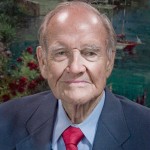Senator George McGovern
-
George McGovern was the Democratic Party’s candidate for President in 1972, and lost to incumbent President Richard M. Nixon in one of the most lopsided landslides in American political history.
His father was a preacher, and McGovern attended public schools, then left college to join the Army Air Corps for World War II. He flew 35 combat missions over North Africa and Italy, and won the Distinguished Flying Cross for piloting his damaged bomber across Yugoslavia to a remote island runway that was far shorter than the minimum length to safely land. McGovern had his crew throw all their non-essential equipment overboard, then both pilots stood on the brake as the plane touched down.
After the war, he came home and resumed his college education. He had been raised in a Republican family, but first registered to vote as an Independent, then worked alongside Paul Robeson as an activist for the Progressive Party, arguing against America’s peacetime draft, and opposing British and American domination of the Middle East. Like most third parties in America, the Progressive Party went nowhere, and McGovern became a Democrat after hearing a fiery speech by Illinois Governor Adlai Stevenson.
McGovern taught history and government at Dakota Wesleyan University for several years, then ran for Congress in 1956, where he served two terms. In 1960 he left the House to run for the US Senate, losing to the Republican incumbent, Karl Mundt, but McGovern kept his campaign workers together and ran for South Dakota’s other Senate seat two years later, defeating Republican Joe Bottum by a narrow margin. He voted for the Gulf of Tonkin Resolution authorizing what became the Vietnam War, but McGovern soon came to believe that the cost of the war, both monetarily and in body bags, could not be justified by the “domino theory” that America needed to hold the line against advancing communism. He became one of the first prominent politicians to speak out against that war, and famously said on the Senate floor, “I’m tired of old men dreaming up wars for young men to fight”.
He ran for President in 1972, and was given little chance of securing his party’s nomination. Republicans, though, saw McGovern as the weakest — and thus the preferred — Democratic opponent, so the Nixon campaign targeted frontrunner Sen Ed Muskie with dirty tricks, including a smear campaign against Muskie’s wife that led to Muskie breaking down in tears on camera. Muskie’s support faltered, and McGovern became the Democratic nominee, running on a promise to end the war, bring home the troops and prisoners held by the Vietnamese, and offering amnesty for draft evaders who had fled the country. When he chose Missouri Senator Thomas Eagleton as his Vice Presidential candidate, questions began surfacing about Eagleton’s past, and McGovern told reporters he stood behind Eagleton “1,000 percent”. Within days it was revealed that Eagleton had once suffered depression, and he was replaced on the ticket by Sargent Shriver.
After losing the Presidential election, McGovern remained in the Senate until losing a re-election bid in 1980. He owned a book store for many years, hosted Saturday Night Live in 1984, and has been a United Nations Global Ambassador on World Hunger since 2001. He was and remains an outspoken critic of the 2003 invasion and occupation of Iraq.













Connect with Roosevelt House